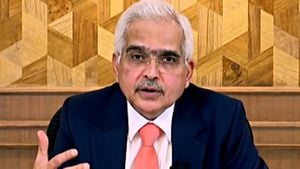Elon Musk and Vivek Ramaswamy are joining forces under the newly minted Department of Government Efficiency, commonly referred to as DOGE, aimed at restructuring the U.S. federal government with sweeping budget cuts and workforce reductions. This ambitious plan, unveiled after President-elect Donald Trump named Musk and Ramaswamy as co-heads of DOGE, has sparked considerable chatter across the political spectrum.
Under the DOGE initiative, Musk has set his eyes on slashing over one-third of the U.S. government’s annual budget—approximately $2 trillion. The proposed overhaul includes reducing the number of federal agencies from 428 down to 99. Meanwhile, Ramaswamy is eyeing dramatic cuts to the federal workforce, hoping to shrink it by as much as 75%, which would amount to the unemployment of roughly 1.5 million federal employees.
This radical restructuring agenda has generated mixed reactions. Supporters argue it addresses inefficiencies and bloated bureaucracies, whereas critics caution it could lead to severe disruptions, particularly to services tied to national security and public health.
At the heart of the DOGE initiative lies the assertion from Musk and Ramaswamy of having the opportunity for significant reform, riding on the coattails of Trump’s electoral victory and the U.S. Supreme Court’s conservative majority. The duo has ambitious plans to pursue structural reductions within the federal system, promising to define their strategies with the flexibility required to combat potential litigation from opposition groups.
If the ambitions of DOGE materialize as intended, there will undoubtedly be challenges along the way. Previous attempts to reshape government processes have often encountered significant roadblocks due to civil service protections and legal frameworks. Critics like William Resh, a public policy expert, point out, “The administrative state is legislated, and they cannot just willy-nilly come in and make these cuts.”
The strategic removal of regulations arises from Musk’s assertion about the stifling bureaucracy hampering his corporate ventures. Ongoing discussions about federal spending have unveiled layers of concerns, including the viability of removing unnecessary regulations without compromising public services.
Another eye-catching aspect of the DOGE plan is its recruitment drive. Musk and Ramaswamy have called for “super high-IQ, small-government revolutionaries” willing to commit to grueling work hours, promising potential recruits the chance to partake in this extensive overhaul without job security guarantees. The recruitment process has even been humorously labeled by Ramaswamy as reminiscent of working with chainsaws as opposed to chisels when attacking government waste.
Despite the provocative promises, the clarity of operational plans remains foggy. The distinction of DOGE as not officially being recognized as a government department has raised eyebrows. Critics suggest the initiative could be more of a public relations effort than substantive reform, echoing sentiments expressed by former Trump administration official who highlighted the advisory nature of the initiative.
Political maneuvering is already underway. Marjorie Taylor Greene, known for her far-right views, has been tapped to lead one of the DOGE subcommittees, aiming to fire government employees as part of the proposed overhaul. Greene’s involvement suggests the underlying political support alignments necessary for pushing DOGE’s agenda through the halls of Congress.
Senator Joni Ernst, also supportive of the bipartisan approach within DOGE, counseled her colleagues to adopt similar cost-cutting measures reminiscent of the Grinch during the holiday spending frenzies within government. She urged them to view wasteful spending practices with skepticism — with her plan targeting extravagant expenditures on items like crab and lobster or unnecessary office supplies.
Ernst’s alignment with Musk and Ramaswamy echoes widespread discontent with the status quo approach to budgeting and governance, emphasizing their sentiment toward reducing operational heft.
With this ambitious and controversial reshaping of the governmental bedrock, the tone of impending legal and political battles around the DOGE initiative has been set. Stripping back government regulations and competencies raises matters of practicality and how it might disrupt day-to-day operations for American citizens.
Legal experts have underscored the inevitability of court challenges, as many policies and operations are entrenched and protected against quick dismantling. How the current administration reacts to pushback from federal employees, civil rights groups, and concerned constituents amid potential service disruptions will significantly influence the efficacy of the DOGE initiative.
Elon Musk’s leadership within this initiative has also sparked conversation around potential conflicts of interest. His businesses are deeply entwined with government contracts, leading to questions about the integrity of the proposed reforms. Critics have pointed out the irony of someone benefiting from government agreements being tasked with dismantling those very structures.
Experts have expressed concerns surrounding the ramifications of such drastic governmental changes could ripple down to everyday citizens, effectively reducing the responsiveness of federal agencies. Custodial roles for regulating industries from safety to financial oversight could potentially suffer, leading to more challenging interactions when citizens seek assistance with federal services.
This historical juncture presents Musk and Ramaswamy with the opportunity to carve their names deep within American governance, albeit amid widespread anxiety over their approach. Advocates maintain the restructuring is overdue and necessary for streamlining the governmental processes but at what cost?
Emerging from the buzz of the DOGE plan is the guiding question around whether the envisioned transformations will yield genuine improvements to government efficiency or if it leans more toward grandstanding without substantive delivery.



